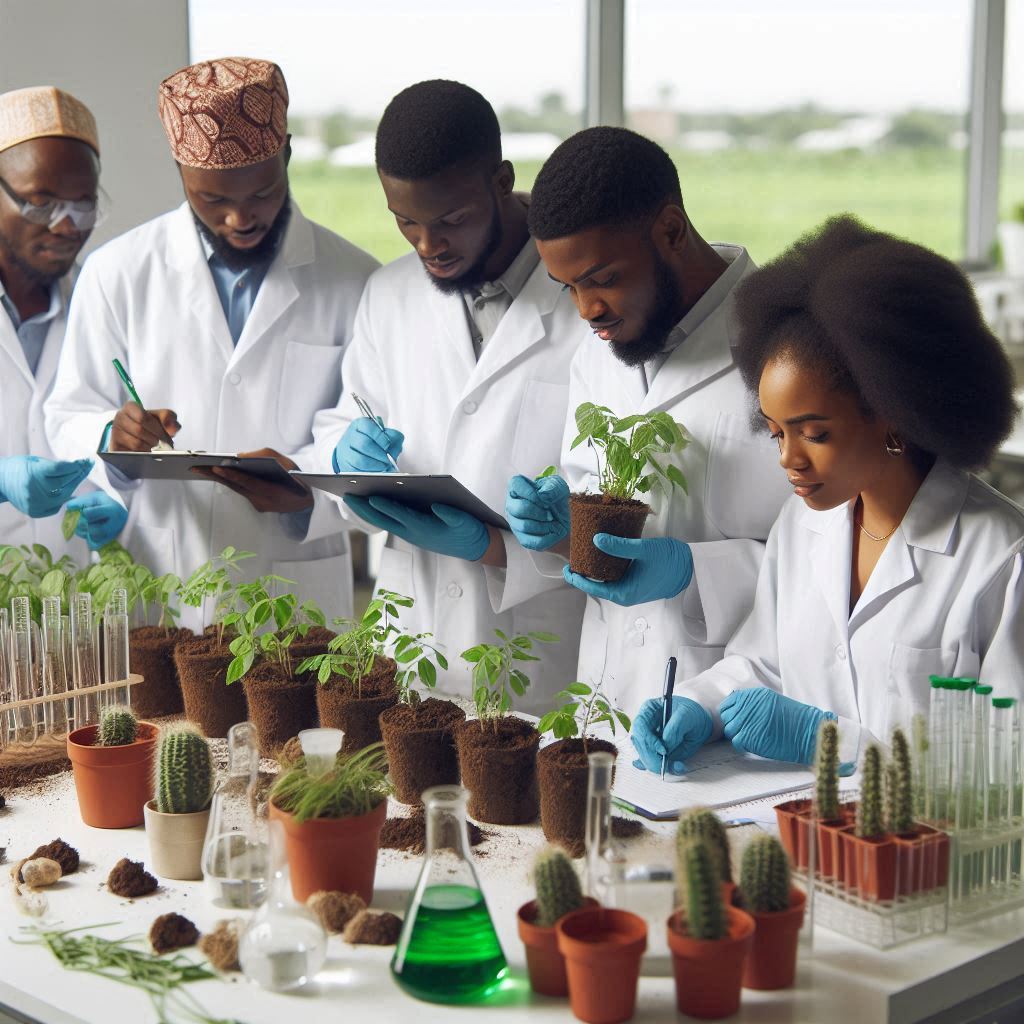Introduction
Agricultural science clubs and societies are vibrant community organizations dedicated to advancing agricultural knowledge and practices.
In Nigeria, these clubs serve as dynamic hubs where farmers, students, researchers, and enthusiasts come together to exchange ideas, share experiences, and collaborate on agricultural initiatives.
The importance of these clubs and societies in Nigeria cannot be overstated.
They play a multifaceted role in the agricultural sector, serving as invaluable platforms for education, networking, and capacity building.
By organizing workshops, seminars, field demonstrations, and outreach programs, these clubs contribute significantly to the dissemination of modern agricultural techniques and best practices.
The history and development of agricultural science clubs and societies in Nigeria reflect the country’s rich agricultural heritage and its commitment to agricultural development.
Originating from the early 20th century, these clubs have witnessed a remarkable evolution, mirroring the transformation of Nigeria’s agricultural landscape.
From humble beginnings to the present day, they have adapted to changing times, embracing technological advancements and responding to emerging challenges.
Major Agricultural Science Clubs and Societies in Nigeria
When it comes to agricultural science clubs and societies in Nigeria, there are several prominent organizations that play a vital role in promoting and advancing agricultural practices in the country.
These clubs and societies have distinct goals, objectives, and major activities that contribute to the growth and development of the agricultural sector.
Here are some of the major agricultural science clubs and societies in Nigeria:
All Farmers Association of Nigeria (AFAN)
- AFAN is a leading agricultural organization in Nigeria that represents the interests of farmers across the country.
- Its main goal is to promote sustainable farming practices, increase food security, and improve the livelihoods of farmers.
- AFAN organizes training programs, workshops, and seminars to educate farmers on modern agricultural techniques.
- One of the successful projects carried out by AFAN is the establishment of farmer cooperatives that facilitate access to credit and inputs.
Nigeria Agribusiness Group (NAG)
- NAG is a coalition of private sector players in the agricultural value chain in Nigeria.
- Its objective is to promote agribusiness investments, policy advocacy, and market linkages for farmers.
- NAG organizes agribusiness summits, trade fairs, and exhibitions to showcase opportunities in the agricultural sector.
- One of the successful initiatives by NAG is the establishment of market hubs that connect farmers to buyers and investors.
Nigerian Youth in Agribusiness Forum (NYAF)
- NYAF is a youth-led organization that aims to empower young people to engage in agribusiness ventures.
- Its major objective is to promote youth involvement in agriculture through capacity building and mentorship programs.
- NYAF organizes agripreneurship boot camps, skill acquisition workshops, and business pitch competitions for young farmers.
- One of the successful projects undertaken by NYAF is the “Youth in Agribusiness” grant scheme that supports youth-led agricultural enterprises.
Society for Organic Agriculture in Nigeria (SOAN)
- SOAN is a non-profit organization dedicated to promoting organic farming practices in Nigeria.
- Its goal is to raise awareness about the benefits of organic agriculture and advocate for sustainable farming methods.
- SOAN conducts workshops, field days, and certification programs for farmers interested in organic farming.
- One of the successful initiatives by SOAN is the implementation of organic demonstration farms in different states across Nigeria.
These are just a few examples of the major agricultural science clubs and societies in Nigeria that are making significant contributions to the development of the agricultural sector.
Their various activities, projects, and initiatives are helping to improve the lives of farmers, promote sustainable farming practices, and create opportunities for youth involvement in agriculture.
Read: Nigerian Educational Technology Associations
Membership and Participation in Agricultural Science Clubs and Societies
How individuals can join agricultural science clubs and societies in Nigeria
Joining agricultural science clubs and societies in Nigeria is a straightforward process. Here’s how individuals can become members:
- Research Local Clubs: Start by researching local agricultural science clubs and societies in your area. Look for organizations that align with your interests and goals.
- Attend Meetings and Events: Once you’ve identified a club or society you’re interested in, attend their meetings and events. This will give you a chance to learn more about the organization and its members.
- Apply for Membership: Most clubs and societies have a membership application process. Follow the instructions provided by the organization to apply for membership.
Benefits of Membership and Opportunities for Participation
Being a member of an agricultural science club or society in Nigeria comes with numerous benefits and opportunities for participation:
- Networking: Membership in these clubs allows you to network with like-minded individuals in the agricultural sector. This can lead to partnerships, collaborations, and career opportunities.
- Skill Development: Many clubs and societies offer training sessions, workshops, and seminars to help members develop their agricultural skills and knowledge.
- Community Engagement: Being part of a club or society provides opportunities to engage with the local community through outreach programs, community service projects, and events.
Tips for Getting Involved and Making the Most of Membership
To make the most of your membership in agricultural science clubs and societies in Nigeria, consider the following tips:
- Be Active: Actively participate in club activities, events, and projects. This will help you build relationships with other members and gain valuable experience.
- Take on Leadership Roles: Consider taking on leadership roles within the club or society. This will not only enhance your skills but also demonstrate your commitment and dedication.
- Collaborate with Others: Collaborate with fellow members on projects and initiatives. Working together can lead to innovative ideas and successful outcomes.
- Stay Informed: Stay informed about upcoming events, opportunities, and developments in the agricultural sector. This will help you stay engaged and make the most of your membership.
Overall, membership in agricultural science clubs and societies in Nigeria offers individuals a chance to connect with like-minded individuals, enhance their skills, and contribute to the community.
By actively participating and taking advantage of the opportunities available, members can make a meaningful impact in the agricultural sector.
Read: Curriculum Studies Scholarships in Nigeria
Impact of Agricultural Science Clubs and Societies in Nigeria
Agricultural science clubs and societies play a vital role in promoting agriculture and rural development in Nigeria.
These organizations have a significant positive influence on various aspects of the agricultural sector, leading to improved productivity, innovation, and sustainable practices.
Positive Influence of Agricultural Science Clubs and Societies
- They provide a platform for knowledge sharing and skill development among farmers and agricultural professionals.
- These clubs and societies promote the adoption of modern agricultural techniques and technologies, leading to increased yields and profitability.
- They contribute to the empowerment of small-scale farmers and women in agriculture through training programs and capacity-building initiatives.
- Agricultural science clubs and societies foster collaboration and partnerships among stakeholders in the agricultural value chain, promoting synergies for growth.
Success Stories and Case Studies
- The Young Farmers Club in northern Nigeria has helped young people engage in agribusiness, leading to economic empowerment and job creation.
- The Women in Agriculture Society has empowered women in rural areas to become successful agripreneurs, breaking gender barriers and promoting inclusivity.
- The Sustainable Agriculture Initiative has promoted eco-friendly farming practices, reducing environmental impact and ensuring food security for future generations.
- The Agribusiness Association has facilitated access to markets and finance for smallholder farmers, improving their livelihoods and income levels.
Potential for Future Growth and Impact
- There is immense potential for agricultural science clubs and societies to expand their reach and impact in Nigeria, especially in remote and underserved communities.
- With the support of government agencies, NGOs, and private sector partners, these organizations can scale up their programs and initiatives for greater effectiveness.
- Investing in agricultural science clubs and societies can lead to sustainable rural development, poverty alleviation, and food security in Nigeria.
- By harnessing the expertise and dedication of members, these clubs and societies can drive innovation and entrepreneurship in the agricultural sector, creating a sustainable future for the country.
Most importantly, agricultural science clubs and societies in Nigeria have proven to be invaluable in promoting agricultural development, empowering farmers, and fostering sustainability.
With continued support and investment, these organizations have the potential to make a lasting impact on the agricultural sector and rural communities in the country.
Read: Digital Learning Platforms in Nigeria

You Might Also Like: Importance of Cybersecurity Education in Nigeria
Explore Further: Challenges Facing Vocational Education in Nigeria
Challenges and Opportunities for Agricultural Science Clubs and Societies in Nigeria
Identifying key challenges
- Lack of funding and resources for clubs and societies.
- Low level of awareness and understanding of the importance of agricultural science.
- Insufficient government support and policies to promote agricultural education.
- Inadequate infrastructure and technological support for agricultural activities.
- Difficulty in attracting and retaining members due to lack of incentives.
Potential strategies for overcoming challenges
- Seeking partnerships with government agencies, NGOs, and private sector for funding.
- Organizing outreach programs and awareness campaigns to educate the public.
- Advocating for policies that support agricultural education and research.
- Investing in modern equipment and technology to improve efficiency.
- Offering incentives such as scholarships, training, and mentorship programs.
Maximizing opportunities for growth and success
- Encouraging entrepreneurship and innovation among members.
- Creating mentorship programs to develop leadership skills.
- Participating in competitions and conferences to showcase achievements.
- Collaborating with industry partners for internships and job placements.
- Networking with other clubs and societies to share best practices.
Enhancing collaboration and networking:
- Organizing joint events, workshops, and training sessions.
- Creating online platforms for communication and resource sharing.
- Establishing formal partnerships and MOUs with other organizations.
- Participating in industry exhibitions and trade fairs for visibility.
- Engaging in collaborative research projects with academic institutions.
By addressing these challenges and capitalizing on opportunities, agricultural science clubs and societies in Nigeria can play a vital role in promoting sustainable agriculture and food security in the country.
Read: Educational Tech Startups in Nigeria
Uncover the Details: Vocational Training Centers in Nigeria: A List
You Might Also Like: Scholarships for Chemistry Education Students in Nigeria
Role of Government and Non-Governmental Organizations in Supporting Agricultural Science Clubs and Societies
The role of government agencies in providing support and resources to agricultural science clubs and societies
Government agencies play a crucial role in providing support and resources to agricultural science clubs and societies in Nigeria. They recognize the importance of these organizations in promoting agriculture and food security in the country.
- Government agencies provide financial support to agricultural science clubs and societies through grants and subsidies.
- They also offer technical assistance and training to members of these clubs to enhance their knowledge and skills in agricultural practices.
- Government agencies facilitate networking opportunities for agricultural science clubs to collaborate with other stakeholders in the industry.
- They create policies and programs that promote the growth and sustainability of agricultural science clubs and societies.
- Government agencies monitor the activities of these clubs to ensure compliance with regulations and standards in the agricultural sector.
The contribution of non-governmental organizations and other stakeholders in promoting the activities of these clubs and societies.
Non-governmental organizations (NGOs) and other stakeholders also play a significant role in supporting agricultural science clubs and societies in Nigeria. They contribute to the development and growth of these organizations through various initiatives.
- NGOs provide funding support to agricultural science clubs for the implementation of projects and programs that benefit farmers and communities.
- They offer capacity-building programs and workshops to members of agricultural science clubs to enhance their leadership and management skills.
- NGOs promote advocacy and awareness campaigns to raise the profile of agricultural science clubs and societies among the public and key decision-makers.
- Other stakeholders, such as academic institutions and research organizations, collaborate with agricultural science clubs to conduct research and innovation in the agricultural sector.
Ways for improving partnerships and collaboration between various stakeholders to strengthen the impact of agricultural science clubs and societies in Nigeria
To strengthen the impact of agricultural science clubs and societies in Nigeria, it is essential to improve partnerships and collaboration between various stakeholders. Here are some recommendations for achieving this goal:
- Establish formal partnerships between government agencies, NGOs, academic institutions, and agricultural science clubs to coordinate efforts and resources.
- Encourage joint projects and programs that leverage the expertise and resources of different stakeholders to address common challenges in the agricultural sector.
- Promote knowledge-sharing and best practices exchange among agricultural science clubs and societies to foster innovation and continuous improvement.
- Engage with local communities and farmers to ensure that the activities of agricultural science clubs are aligned with their needs and priorities.
- Advocate for policies and regulations that support the growth and sustainability of agricultural science clubs and societies in Nigeria.
By enhancing partnerships and collaboration among government agencies, NGOs, academic institutions, and other stakeholders, agricultural science clubs and societies can maximize their impact and contribute significantly to the development of the agricultural sector in Nigeria.
Conclusion
In concluding our discussion, it’s evident that agricultural science clubs and societies in Nigeria serve as indispensable catalysts for agricultural progress.
These organizations, comprised of farmers, students, researchers, and enthusiasts, play a multifaceted role in advancing agricultural knowledge, practices, and innovation.
Throughout this blog post, we’ve delved into the pivotal role these clubs play in disseminating modern agricultural techniques, bridging the gap between academia and rural communities, and promoting sustainable agricultural practices.
By organizing workshops, seminars, field demonstrations, and outreach programs, they contribute significantly to capacity building and knowledge dissemination.
The significance of agricultural science clubs and societies cannot be overstated.
They are instrumental in driving agricultural development and rural transformation in Nigeria.
As we reflect on their importance, it’s imperative to recognize the tireless efforts of individuals and organizations involved in these initiatives.
Looking ahead, it’s essential to encourage readers to actively engage and support the work of agricultural science clubs and societies.
By volunteering, participating in events, or providing resources, individuals can contribute to the collective efforts aimed at enhancing the agricultural sector’s resilience and productivity.
In supporting agricultural science clubs and societies, we collectively invest in the future of Nigerian agriculture.
By fostering collaboration, innovation, and knowledge exchange, these organizations pave the way for sustainable agricultural development, food security, and economic prosperity for generations to come.




